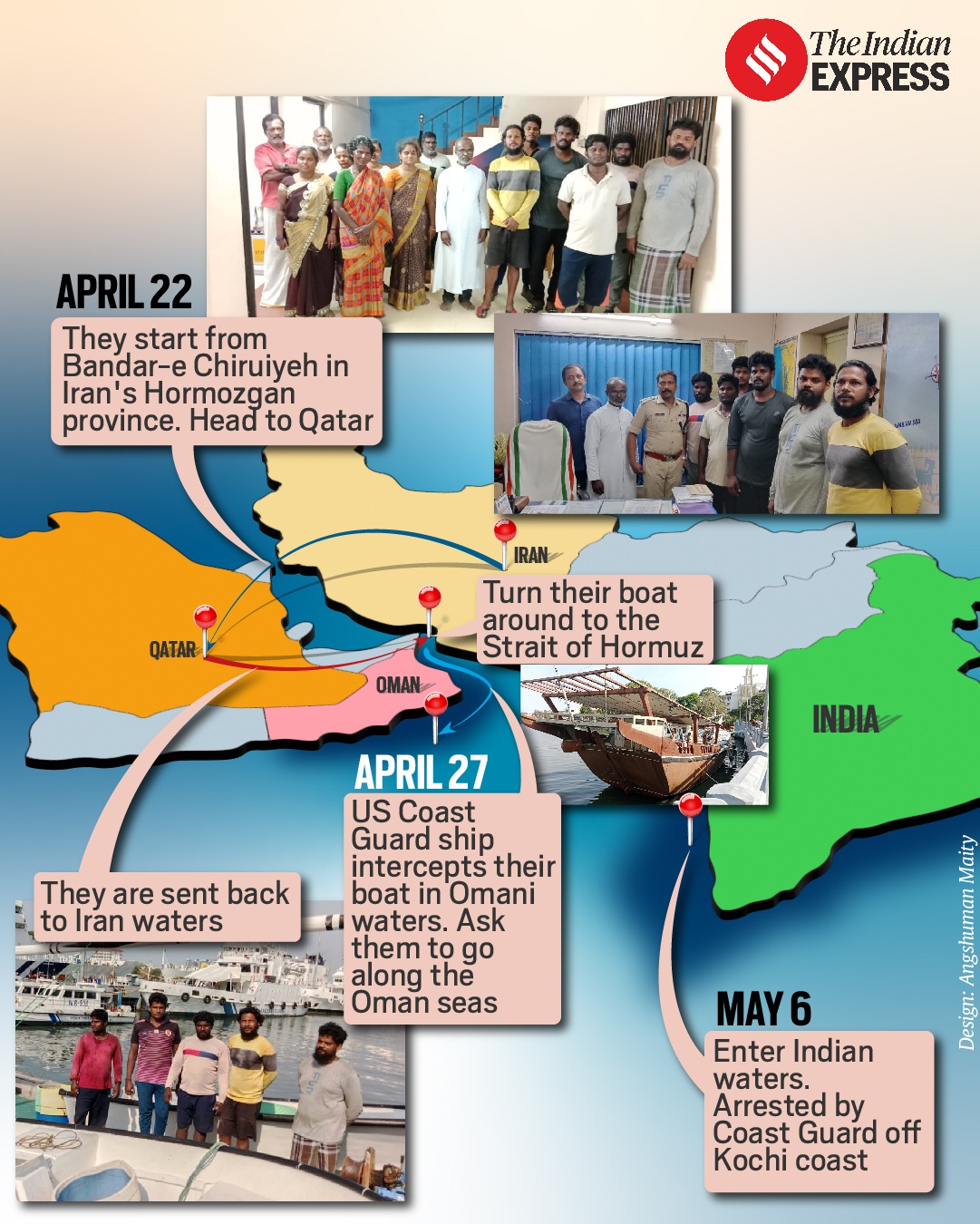Nothing about the day seemed extraordinary. On the morning of April 22, the sea crashing into the predawn darkness of the shore, the six fishermen hauled their nets, hooks, baits and food supplies onto the deck of the boat, and set sail. Just as they did every day.
Except, that day, the six men in the boat had a daring plan: to flee their employer in Bandar-e Chiruiyeh, a harbour in the Iranian province of Hormozgan, and sail all the way back home to India, a distance of over 1,500 nautical miles, threading the geopolitically volatile Strait of Hormuz before entering the forbidding, blue expanse of the Arabian Sea.
On May 6, after two weeks of dodging patrol ships and surviving rough weather on the seas, the six men sailed into Indian waters.
This is the story of Nithya Dayalan, 31, his brother Arun Dayalan, 29, cousin Kalidas Kumar, 22, Muneeswaran, 37, Rajendran, 38, and Maria Dennis, 37, and their long, perilous journey from Iran through Qatar, the Strait of Hormuz and Oman, before they were detained by the Indian Coast Guards off the Kochi coast.
After the initial inquiries, the six are now back in their homes in Tamil Nadu. While five of them are from Ramanathapuram district, Dennis is from Kanyakumari.
 After the initial inquiries, the six are now back in their homes in Tamil Nadu. (Express photo)
After the initial inquiries, the six are now back in their homes in Tamil Nadu. (Express photo)
Speaking to The Indian Express from his home in the Thiruppalaikudi fishing hamlet in Ramanathapuram, Nithya Dayalan says that it was early last year that he and some of the others got an offer to work on a fishing vessel in Iran.
He says that for fishermen like him in Tamil Nadu, life on the sea has never been easy. “There isn’t enough fish, the weather is erratic, there are restrictions on fishing, and the cost of living has shot up. It has become difficult to sustain our families,” he says.
So when a friend from Kanyakumari told him about a “reliable employer” in Iran, he didn’t think twice.
Finally, sometime in January last year, Dayalan, his cousin Kalidas and Dennis from Kanyakumari flew from Thiruvananthapuram to Tehran via Dubai. The others joined them in Iran around September last year.
In Iran, they were taken to Bandar-e Chiruiyeh, located on the northern shore of the Persian Gulf, where they began working on a vessel owned by an Arab, Syed Jaffareh.
 Finally, sometime in January last year, Dayalan, his cousin Kalidas and Dennis from Kanyakumari flew from Thiruvananthapuram to Tehran via Dubai. The others joined them in Iran around September last year. (Express photo)
Finally, sometime in January last year, Dayalan, his cousin Kalidas and Dennis from Kanyakumari flew from Thiruvananthapuram to Tehran via Dubai. The others joined them in Iran around September last year. (Express photo)
The work turned out to be far tougher than they imagined. “Our routine was backbreaking – 10 days at sea, followed by 10 on land. We barely got two hours of sleep a day while at sea,” Dayalan says.
He says that while they were promised Rs 30,000 to 40,000 a month, most months, they barely got Rs 10,000. “Gradually, even that stopped. Our employer denied us food when we said we would not go to sea without being paid. But the employer had taken away our passports and there was little we could do. We were trapped,” he says.
Finally, on April 22, Dayalan and the others decided to flee. The plan was to stray into Qatar waters and turn themselves in, in the hope that they would be deported to India.
That morning, Dayalan turned on the boat’s ignition and the 350 cc Chinese engine stirred to life. Soon, the wood-and-fiberglass vessel was bobbing in the sea, the Iranian coast now a distant streak on the horizon.
 Soon, the wood-and-fiberglass vessel was bobbing in the sea, the Iranian coast now a distant streak on the horizon. (Express photo)
Soon, the wood-and-fiberglass vessel was bobbing in the sea, the Iranian coast now a distant streak on the horizon. (Express photo)
“When we entered Qatar’s (maritime) border, we were confronted by their coast guards. We pleaded with them to arrest us and take us to the Indian embassy. But they said we would be kept in prison for six months for entering their waters before being taken to the embassy. They advised us to go back to our employer or go to the Indian embassy in Iran,” he says.
But for the fishermen, going back was never an option. “The Indian embassy is about 600 km from where we lived. We didn’t have money to travel that far. Besides, we had no passports,” he says.
Returning to Iranian waters, they turned their boat around to the Strait of Hormuz, a critical choke point in the Persian Gulf and the only passage into the Indian Ocean. “From there, we sailed towards the Oman border,” says Dayalan.
Most days, their small boat would be the only vessel for as far as they could see. The little food they had was running out, so they would eat only once a day – mostly kuboos and fish curry .
The days stretched on. “We took turns to be at the steering wheel. There would be two of us at the wheel for at least 3-4 hours, after which somebody else would take over. We kept our eye on the GPS to know where we were, if we were crossing international (maritime) boundaries. One of us would monitor the engine and stay alert for leaks, while the others caught up on sleep,” he says.
Some days were torrid as they were caught in storms and heavy rains. “Somewhere near Oman, a storm hit our boat and water entered the radiator. We had to switch off the engine and manually drain out the water. As we started sailing again, there was another storm and this time, water entered the gearbox. We managed to clean it and used some poor-quality oil that we had to operate the gearbox again,” he says.
Then, on April 27, around 8 am, a US coast guard ship intercepted their boat in Omani waters. “We spoke to them in detail (over the wireless radio Channel 16) about our plight,” says Dayalan. “We could only speak broken English, but surprisingly, they listened to us patiently and understood what we were saying. Finally, they told us to leave, but we pleaded with them to arrest us and take us to the Indian embassy in Oman.”
 The ship’s journey
The ship’s journey
The US coast guards did not heed their request but did not abandon them either. Dayalan says, “They asked us to go along the Oman seas. And then, we noticed they were following our boat. We were nervous. Gradually, we realised that they were probably escorting us. Maybe for our safety?”
“They followed us till evening. Then, before sunset, we saw them lowering a boat from their ship. Four officers — two men and two women — approached our boat,” he adds.
After a basic inspection of the fishing boat, the US officers left, but not before giving the fishermen a few “gifts”: sunglasses, medicine kits, snacks and drinking water. “They also gave us a card with the Oman Coast Guard number on it and told us to use it if we were stopped in Oman waters again,” Dayalan says.
The experience left them relieved and grateful, says Dayalan. Their journey continued through Omani waters until they entered Indian waters after about five days of sailing. “By then, we were running short of diesel and kept praying and hoping it would last some more days.”
Finally, in the early hours of May 5, as they approached the Kerala coast, a sense of relief washed over them.
“We hadn’t been in touch with our families for almost two weeks. They had no idea that we were at sea. We had two Indian SIM cards among us. So we managed to talk to a Tamil fishing boat over our wireless, shared our SIM card numbers, and requested them to get it recharged by someone on the shore. They did that and we called our families and told them to immediately come to Kochi.”
Soon, they spotted an Indian Coast Guard ship. “We approached them. After conducting an inquiry, they took us to the Kochi harbour,” Dayalan says, adding the police confiscated their phones and their Iranian boat, No: 3/11875, and let them off.
Now back home, Dayalan spends his days doing what he always did: at 4 am, the sea crashing into the predawn darkness of the shore, he hauls his nets, hooks, baits and food supplies onto the deck, and sets sail. Nothing about his days seem extraordinary.











